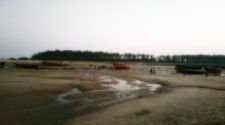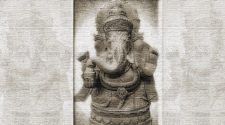With all the moderate voices out of the picture, there were only two ways left, for this conflict to grow. The Chinese could drive the British from their shores and clamp down on trade with the outside world, or the British could bring the great empire to their knees and force them to trade on their terms. There was no possibility of any other resolution. The Chinese emperor dismissed Qishan and summoned three of his men to replace him and takeover the efforts against the British- Yang Fang, his nephew who would serve as the main commander along with Yishan as General-in-Chief of repressing the rebellion and Longwen as an assistant regional commander. Before they left, Longwen mentioned something about peace and letting British to do trade with them while they could modernize and strengthen the Chinese army but the emperor was not ready to listen to him. They were supposed to take back what had been lost in the battle. Chinese forces amassed all around Canton.
Elliot was still there and had been trying his best to limit the opium that flowed into the British-controlled port but his efforts met with limited or no success. The same official who had tried to reason with the emperor, now reached out to him, hoping that the large number of army-men that he had brought with him, would equip him with some advantage during the negotiation and perhaps get Elliot to agree to a better deal. Instead, the move bounce back on them, because Elliot began to muster the British marines and asked British, French and American merchants to withdraw from Canton before war followed. By 22 May 1841, the Chinese were shelling the British factories in the town. In the night they launched the fire ships across the river at the becalmed British forces. The great steam-ship Nemesis charged up its steam, powering them out of harm’s way. The fire ships missed rest of the fleet, sailing past, slamming and setting it on fire. A battle of guns took place and by dawn, the river was firmly under the control of the British while the guns at the Chinese fort were silenced. Now the British turned to go offensive, however it was delayed due to a plea for truce from the side of the Chinese. Two days later one of the Chinese commanders decided to break the truce in desperation. They launched manned fire ships to try to destroy the British fleet, but to no avail. In the end, the Chinese had to pay an indemnity to the British for an access to Canton. On the other hand, riots by the peasants, looting by both British and Chinese armies, the complete lack of resolution on the matter of the opium trade, and Hong Kong issues took it further. However, as the British withdrew to regroup at Hong Kong, a typhoon hit. The cutter that Elliot was on smashed, leaving him swimming with a flotsam. It brought him closer to a shore, which he could identify as Hong Kong. He started swimming faster. Over the horizon he saw a battened sailor of a Chinese war junk approaching him from afar. He knew he had to swim for his life. The shore was near, and all he had to do was to make it until there. Exhausted, he dragged himself onto the shore, only to be greeted by the news that his services were no longer required. Actually, he was fired 4 months ago, but it was 1841 and getting news halfway across the world took a while. Thanks people like his boss Lord Palmerston (As Promised, He Cropped Up), the men Elliot was replaced with were far less inclined to find a common ground with the Chinese. They were hard pressing on expanding the rights of the British Empire by any means that would be necessary and the war was not to be postponed by means of talks of peace, truce or ceasefire.
Thus, the British began their campaign in north and east, capturing fortresses after fortresses, on their way. With every fortress falling one after another, threat of losing this war grew apparent to the emperor in Beijing. Each fallen citadel was another jumping off point that the British now held. They were ever closer to the Chinese capital, and this time it would be a point of no return. The Emperor Knew that there would be no giving back of territories unless all British demands were met. These islands and fortresses that the British captured were mere hostages, not to be handed over as a sign of good faith or as a part of an agreement to peace but only in exchange of favours. As they took over the fortresses, they found something strange. Everywhere they went, next to the canon, in the guard towers, they would find opium pipes. Was it that the Chinese resistance was destined to be weakened by the very substance they were supposed to be fighting against? From the officers to the enlisted men, much of the army seemed to be addicted to the drug. If it was really one of the causes, Chinese inadequacy remains debatable. The British Forces on the other hand were instructed not to loot and they forbade cutting off the head of prisoners’ for trophies. However, when one of the British soldiers was kidnapped and beaten during a resupply-mission, they had no problem burning several of the villages in retaliation. It was as if they could train the civilian population by means of severe punishment. As the winter of 1841 passed itself on to the spring of 1842, the Chinese attacks became even more desperate, and the retaliation simply became more brutal. However, the advances pressed on. By the middle of June Shanghai was taken and then, in July, Zhenjiang, where we got a prelude of what’s to come with the Manchu commander turning on Chinese populace, illustrating the cultural and racial divides that would tear China apart over the next 60 years. It was to be the Tai Ping civil war in 1850. After securing the Zenjiang, the British finally moved to Nanking. Both sides knew this would be the final showdown.
British didn’t have to seize the capital of Beijing because Nanking stood at the entrance to the Yangtze, the river which flows through the heart of China. It was the super waterway through which all trades went down with the capital. If Chinese access to the Yangtze could be cut off, then all of China would be in a chaos. So, it all came down to capturing Nanking. However, there would be no great showdown and no final battle because the emperor finally began to realize that he was beaten and if Nanking were to be captured, there would be only surrender. So it was better to negotiate while he still could. He sent down an official to talk to the British, At first, the discussions went nowhere as the British demanded that the official be given authority to make binding deals for his government, the lack of which that court in Beijing had taken advantage of in prior deals, to get out of treaties made by other officials. Cultural misunderstandings and attempts to delay as long as possible by the Chinese officials delayed the process slightly further but by the middle of August, under imminent threat of attack on the city, negotiations commenced. In the end though despite technically holding the Nanking city, it was clear who had all the leverage, whose gunboat can impose their will if negotiations failed and the Chinese ended up conceding on every point.
The six million Elliot had asked for now became 21 million and the amount was granted. A number of new ports for trade were opened up. The old Cohong monopoly was abolished and tariff rates were to be agreed upon rather than set by the sovereign Chinese government. The island of Hong Kong was ceded in perpetuity to the British and the British subjects were to operate there under British law, completely free from jurisdiction. British consulates were established at the treaty ports. The only two things that the Chinese didn’t concede on, were Christian missionaries, which was such a touchy subject that not even the British delegation tried to bring it up. The Chinese refused to legalize Opium. Even the British representatives tried to lean on them to do so, but though the Chinese had no power to prevent its sale, they steadfastly refused to legalize the drug. This eventually led to the Second Opium war, a conflict that played out with shockingly similarity to the first.
Britain was still in a huge trade deficit with China and the only thing salvaging British finances was the continued sale of Opium from British India moving into China. Another problem was that China was dealing with the ‘Taiping Rebellion’ whose leaders kept destroying opium wherever they found it, while he sale of Opium was vital for balancing Britain’s finances. In late 1856 the governor of Cnaton, Yi Ming Chen impounded a Chinese operated ship that he believed was committing piracy or at least working on behalf of the rebels. One problem though, the ship was registered in Hong Kong which now wass a British territory and frankly ‘British Council’ to China Harry Parkes was was getting itchy for another war because he wanted to make a name for himself.
After the Chinese returned the 14 captured prisoners, he demanded an apology from the emperor, which he did not get and so he took the Royal Navy up the Pearl River and shelled Canton. Back in Britain, the parliament was fiercely against any war with China and voted against it because of the outbreak of a major mutiny in India during 1857. However, the Prime Minister – Lord Palmerstone was very much for it. He called an election and after denouncing the Chinese as barbarians to the British, he won, and war it was! An alliance was built with the French because they also wanted to trade with China but the Americans after taking the fort in late 1856 declared neutrality and Russia was still recovering from Crimean war. Thus, the second Opium war followed a similar path to the first. The Royal Navy obliterated Chinese war junks wherever they met. In December 1857 Anglo-French forces captured Canton and imprisoned Yi in Fort William, Calcutta. Soon after the Chinese emperor Jian Feng of the Ching dynasty opted for peace and the negotiations resulted in the treaty of Tianjin or Tientsin, which gave France, US, Russia and Britain more open ports to trade and the right for its citizen to travel across China, unabated.
This move of letting Russia and US a cut it on the deal repressed any future rebellion from any major allies. In addition, the Russians had just negotiated a transfer of the territory where Russia used the Chinese court’s preoccupation with the Taiping rebellion and China’s difficult relations with the British to secure the annexation of the Amur region. When mediators went to Beijing in 1859 they were kidnapped and tortured by the Chinese. This, for the British, was enough to justify their opinion about the Chinese. The commander in the front, Earl of Elgin was actually against the war but after this incident, even he vowed to protect the interest of the Crown.
British and French then landed their forces in the North and captured forts at Dagu on their way to Beijing. They soon clashed with the large Qing army in the battle of Palacow. They saw over a thousand Chinese casualties compared to a meager 50 on their side. The Chinese were too confused and dazed to continue the war mainly due to the ‘Taiping Rebellion’. After the Anglo-French soldiers captured Beijing, the emperor fled the scene, leaving his brother prince Gong to negotiate. That is when the famous incident occurred. The Europeans forced their way into the emperor’s summer palace and when Elgin found that the Chinese had killed many of the envoys he ordered it burned to the ground. The Chinese then signed the 1860 treaty of Beijing. The treaty was a more caramelized version of 1857 treaty. Interestingly this time the war was not about Opium. Rather, with most of the colonial power involved it was a show of superiority and dominance.
These two wars and the treaties which followed, would go down the Chinese history by the name of ‘Unequal Treaties’ and began what would later be labelled by the communist government as the “Century Of Humiliation.” While at the time they may have seemed just a part of a larger destabilization and realignment of the century as a whole, they have since been seared into the Chinese consciousness and to this day are conjured whenever dealings with the West take a turn towards the worse. They are used as a milestone, a measuring marker for how far the country has come in the last hundred and fifty years and as propaganda to remind everybody of that fact.
While these wars perhaps had the lowest casualty counts of any of the conflicts that histories have ever shown, they have a profound impact on global politics all the way until today, when the ‘Opium War’ has long been over but its effects on international politics have lingered with time in many significant ways. Not getting into the details of it, they were imminent. The brief series on ‘Opium War’ ends here. Hope it pushed you to revisit the history books and delve into the details, further.
Thank you for your time.
Featured image courtesy: pxhere.com





















